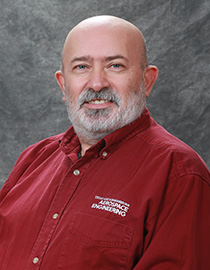 Dr. Daniele Mortari, professor in the Department of Aerospace Engineering at Texas A&M University, has been named an IEEE Fellow. Mortari was recognized for his contributions to navigational aspects of space systems.
Dr. Daniele Mortari, professor in the Department of Aerospace Engineering at Texas A&M University, has been named an IEEE Fellow. Mortari was recognized for his contributions to navigational aspects of space systems.
The IEEE Grade of Fellow is conferred by the IEEE Board of Directors upon a person with an outstanding record of accomplishments in any of the IEEE fields of interest. IEEE Fellow is the highest grade of membership and is recognized by the technical community as a prestigious honor and an important career achievement.
Mortari has shown exceptional research performance and has clearly demonstrated a number of unique talents and important capabilities of significant value to the field of space flight mechanics and navigation. Mortari has made a significant and permanent impact on both fundamental theory and practice of space flight, impact that has given honor to IEEE and to Texas A&M. In particular, his expertise in spacecraft navigation, guidance and control, is of vital significance to the field. He is an international authority in spacecraft mechanics with two main areas of specialization: spacecraft navigation (with emphasis on attitude sensors data processing) and constellations design. He has made fundamental contributions that have significantly re-shaped these fields and impacted theory and practice in both areas.
In regards to spacecraft navigation, in terms of spacecraft attitude estimation, he has developed several fundamental algorithms to estimate the orientation of spacecraft, one of the most critical tasks in spacecraft navigation. In sensor data processing, he has developed an extremely efficient and elegant solution available for identifying stars from a randomly pointed image of a star-field. This algorithm is used in most of the satellites with star trackers as the gold standard for both efficiency and reliability. At the heart of this solution he has developed a new range searching technique called k-vector that has found many applications in other research areas, such as geoscience, computational fluid dynamics, level-set analysis and space debris database management.
Recently, NASA-JSC assigned Mortari the task of developing the image processing of the vision-based navigation algorithms for the three manned NASA Orion missions. The main purpose of this backup software is to estimate the spacecraft position by processing Earth, moon or Mars images. This software will become active in case of communications loss. If this happens, Mortari’s algorithms will be tasked to bring the astronauts back to Earth.
In the field of constellation design, he has developed the “Flower Constellations,” an entirely new class of spacecraft constellations. This design involves novel periodic configurations with respect to assigned rotating reference frame (e.g. Earth). Mortari has developed a tool that allows efficient optimization over this family of constellations subject to user specified constraints. He has proved that the approach leads to better observability with two fewer satellites than in the existing GPS constellation. Since these satellites are large and extremely expensive, the practical implications of the Flower Constellations design tool (i.e. fewer spacecraft in a new constellation design without performance degradation) are enormous. This new design methodology has a wide range of civilian and military applications in telecommunications, Earth and deep space observation, global positioning systems, and more.
In his 12 years in the Department of Aerospace Engineering, Mortari has graduated 12 Ph.D. students and six master of science students. He has taught at the School of Aerospace Engineering of Rome’s University, and in electronic engineering at University of Perugia. He graduated in nuclear engineering from University of Rome “La Sapienza,” in 1981. He has published about 275 papers, holds a U.S. patent, and has been widely recognized for his work, including receiving a best paper award from AAS/AIAA, two NASA Group Achievement Awards, the 2003 Spacecraft Technology Center Award, and the prestigious 2007 IEEE Judith A. Resnik Award. He is an AAS Fellow, an AIAA Associate Fellow, an IEEE Distinguish Speaker and an Honorary Member of IEEE-AESS Space System Technical Panel.
The IEEE is the world’s leading professional association for advancing technology for humanity. Through its 400,000 members in 160 countries, the IEEE is a leading authority on a wide variety of areas ranging from aerospace systems, computers and telecommunications to biomedical engineering, electric power, and consumer electronics.
Dedicated to the advancement of technology, the IEEE publishes 30 percent of the world’s literature in the electrical and electronics engineering and computer science fields, and has developed more than 900 active industry standards. The association also sponsors or co-sponsors nearly 400 international technical conferences each year. To learn more about IEEE or the IEEE Fellow Program, visit the IEEE website.